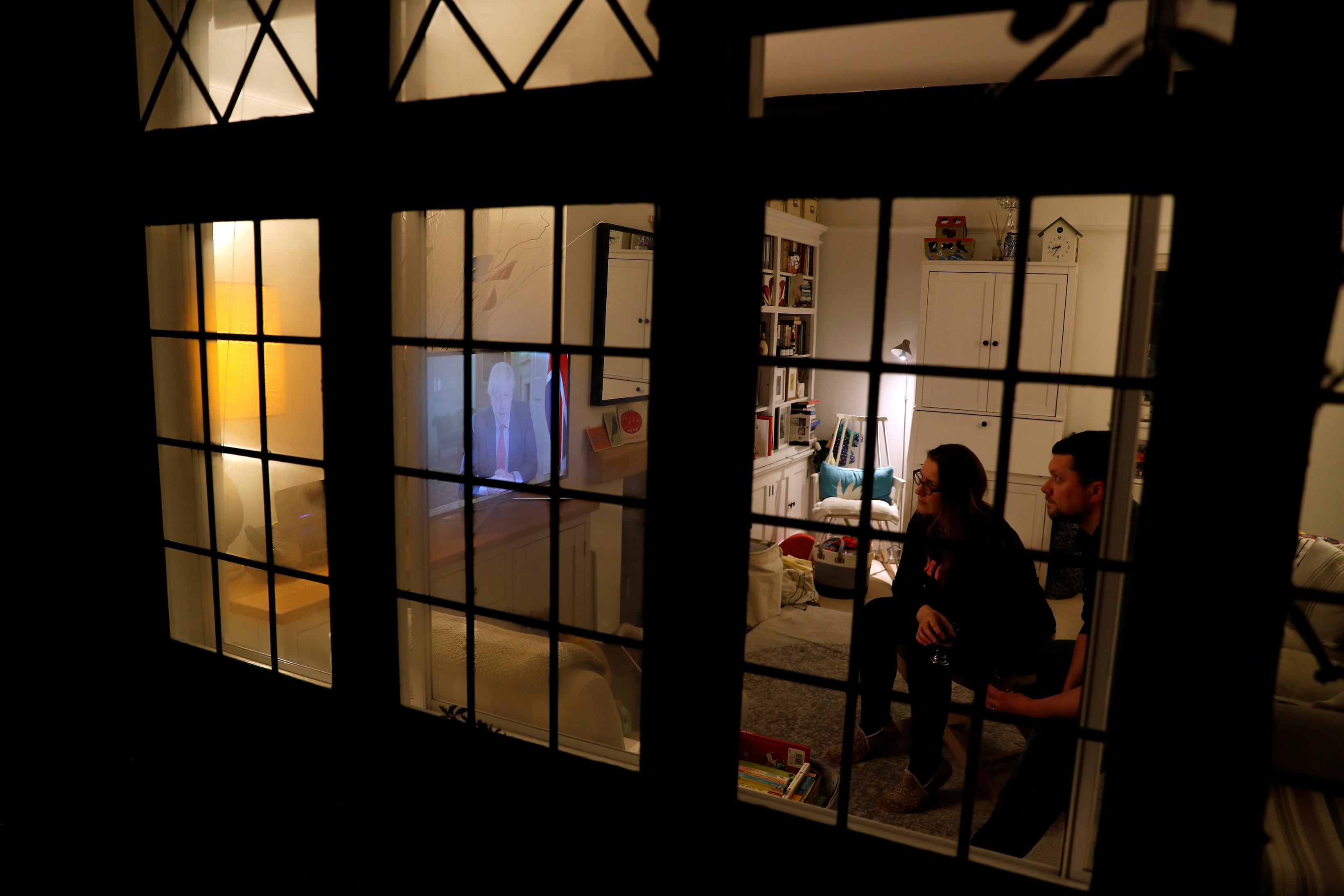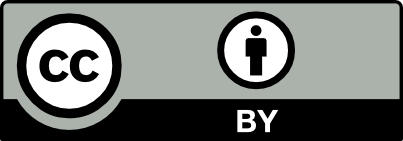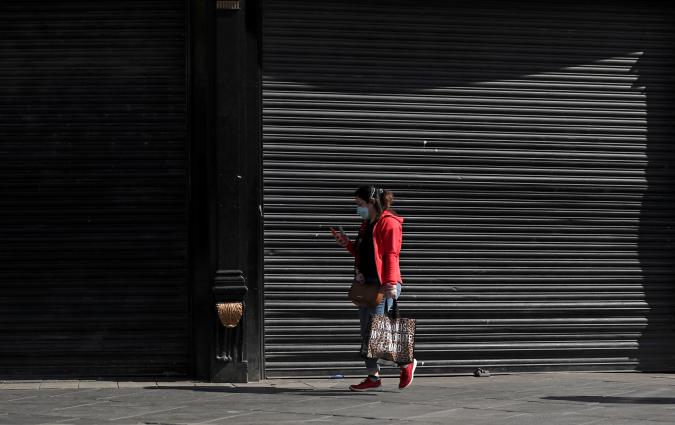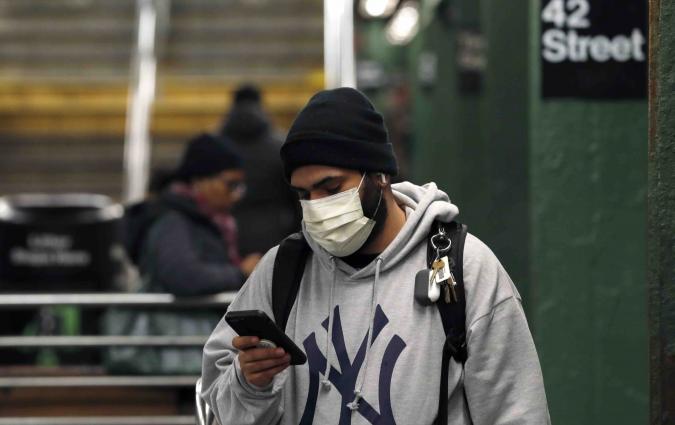In this piece
UK public opinion polarised on news coverage of government coronavirus response and concern over misinformation

An isolated couple watch Boris Johnson's press conference in Weybridge, Britain. REUTERS/Peter Nicholls
In this piece
Key findings | Overview | Findings | Footnotes | References | About the authors | Funding acknowledgementThis is the second factsheet of the UK COVID-19 news and information project.
DOI: 10.60625/risj-tsk4-p495
Key findings
In this Reuters Institute's factsheet we examine people’s attitudes towards how news organisations, government and other institutions are responding to the coronavirus pandemic in the UK based on a survey fielded from 24 April to 28 April.
- UK public opinion is split three ways between those who think the news media have not been critical enough of the government response (30%), those who think it has been covered fairly (28%), and those who think the coverage has been too critical (29%).
- Judgement of news coverage is polarised along political lines, with 63% on the left feeling the news media have not been critical enough, and 66% of those on the right saying news media has been too critical of the government.
- About a third of our respondents say they are very or extremely concerned about false or misleading information about coronavirus from the UK government (32%), from individual politicians (36%), from news organisations (31%), and from ordinary people whom they do not know personally (33%).
- Although there are small differences in concern over potential misinformation from news organisations, opinion is broadly similar across the political spectrum. However, concerns over the UK government as a potential source of misinformation are polarised along partisan lines, with 51% of respondents on the political left saying they are very or extremely concerned about false or misleading information from the UK government, versus 22% among those on the right.
- Asked to compare the UK government’s response to most other developed countries, almost half (46%) say it has been worse, around a third (36%) about the same, and 12% say better. Again, responses are highly polarised along partisan lines.
- Overall, most respondents (55%) still think that the current approach has found the right balance between protecting the economy and protecting people from coronavirus. One-in-five (19%) say it is too focused on protecting the economy, 14% too focused on protecting people from the virus. Responses to this question are less polarised. 41% on the political left say the current balance is right.
Overview
This is the second in a series of ten factsheets based on an ongoing online panel survey of a representative sample of the UK population. The survey was designed by the Reuters Institute for the Study of Journalism at the University of Oxford to collect data on how people navigate news and information during the coronavirus pandemic and was fielded by YouGov. Ten waves will be fielded at two-week intervals, top-line findings from each will be published soon after in a factsheet, with more in-depth analysis to follow. More details about the project and the methodology can be found on the project website. The survey is a mix of tracking questions and specific questions fielded only in some waves.
Findings
News is central to how people understand the coronavirus crisis and evaluate the government’s response to it. But people’s perception of both the government response, and the news coverage of it, is highly polarised along political lines.1
When asked for their view about the news media’s coverage of the UK government’s response to coronavirus, UK public opinion is split three ways between those who think the news media have not been critical enough of the government response (30%), those who think it has been covered fairly (28%), and those who think the coverage has been too critical (29%). In line with in-depth qualitative research, it is clear some – though not all – want more media scrutiny of the government’s response (Cushion et al., 2020).
There are very pronounced political differences in people’s judgement of news media coverage of the government response. To measure this, we asked people to place themselves on a seven-point scale ranging from ‘very left-wing’, through ‘center’, to ‘very right-wing’. Those that selected either ‘very left-wing’ or ‘fairly left-wing’ were grouped as being on the left, with the process mirrored to group those on the right.
For those that self-identify with the left, 63% say the news media has not been critical enough of the government response. However, for 66% of those on the right, the news media has been too critical of the government (see Figure 1).
Figure 1. Proportion that think the news media has ___ by political leaning
CRITICAL. Which of the following comes closest to your view about the news media’s coverage of the UK government’s response to the coronavirus pandemic? The news media has ___ Q1F. Some people talk about 'left', 'right' and 'centre' to describe parties and politicians. With this in mind, where would you place yourself on the following scale? Base: Left = 555, All = 2,291, Right = 366.
Many in the UK are not simply critical of the government’s response and news coverage of it, but also concerned that the UK government and individual politicians are spreading false or misleading information about the coronavirus.
About a third of our respondents say they are ‘very’ or ‘extremely’ concerned about false or misleading information about coronavirus from the UK government (32%) and from individual politicians (36%). However, we see similar levels of concern about false and misleading information from news organisations (31%) and from ordinary people whom they do not know personally (33%). (As these are not mutually exclusive, people can express concern over multiple different sources of potential misinformation.)
Concerns over government as a source of misinformation are polarised along partisan lines, whereas concern over potential misinformation from news organisations less so (Figure 2). 51% of respondents on the political left say they are very or extremely concerned about false or misleading information from the UK government, versus 22% among those on the right.
Figure 2. Proportion that are concerned about each as a source of false or misleading information about coronavirus by political leaning
Q11. How concerned, if at all, are you about false or misleading information about coronavirus (COVID-19) from each of the following? Q1F. Some people talk about 'left', 'right' and 'centre' to describe parties and politicians. With this in mind, where would you place yourself on the following scale? Base: Left = 555, All = 2,291, Right = 366.
Concerns over whether news coverage is critical enough (or too critical), as well as concern over potentially false and misleading information from political actors are in part tied to the high levels of political polarisation in how people judge the UK government’s response overall, documented in our first factsheet (Fletcher, Kalogeropoulos and Nielsen, 2020).
To get a more nuanced understanding of people’s perception of how well the UK government has handled the crisis, we have asked several more focused questions.
One way for people to evaluate the UK government’s response is through comparison with other countries. Some experts argue that such comparisons can be flawed (Spiegelhalter, 2020), but they have featured prominently in much news coverage nonetheless.
We asked respondents whether they think that the government’s response to the coronavirus pandemic has been better, about the same, or worse than most other developed countries. Almost half (46%) say worse, around a third (36%) about the same, and 12% say better.
Unsurprisingly, those on the right judge the government less harshly than others – but still only a minority (27%) think that the UK government’s response has been better. Most think it has been about the same (53%). For those on the left, a clear majority (75%) think that the response has been either worse or much worse (Figure 3).
Figure 3. Proportion that think the UK government’s response has been ___ than other countries by political leaning
OtherCountries. Do you think that the UK government’s response to the coronavirus pandemic has been better, about the same, or worse than most other developed countries? Q1F. Some people talk about 'left', 'right' and 'centre' to describe parties and politicians. With this in mind, where would you place yourself on the following scale? Base: Left = 555, All = 2,291, Right = 366.
In recognition of the many complex and sometimes partially contradictory concerns and interests that policy responses necessarily have to balance in this difficult situation, we also asked respondents how well they feel the UK government has balanced between protecting people from coronavirus and protecting the economy. In the long term, this will be a false binary because the health of the population and the health of the economy are intertwined, but for the time being, this is how the issues are often framed.
Despite the fact that nearly half of people think that the UK response has been worse than in other countries, most people (55%) still think that the current approach has found the right balance between protecting the economy and protecting people. One-in-five (19%) say it is too focused on protecting the economy, 14% too focused on protecting people from the virus.
There are political differences in how people think about this, but even among those on the political left, 41% say the current balance is right (Figure 4). While many aspects of how people understand the coronavirus crisis and responses to it are shaped by partisanship, not everything is equally polarised along political lines, even when it comes to perception of some aspects of the government’s response.
Figure 4. Proportion that think the UK government’s current approach is ___ by political leaning
Economy_Lockdown. Which of the following comes closest to your view about the UK government’s current approach to the coronavirus pandemic? The current approach is ___ Q1F. Some people talk about 'left', 'right' and 'centre' to describe parties and politicians. With this in mind, where would you place yourself on the following scale? Base: Left = 555, All = 2,291, Right = 366.
Finally, our survey was in the field from 24 April to 28 April, a period in which hospital deaths from COVID-19 in the UK grew from 21,787 to 24,393 (Roser et al., 2020), and where there was considerable news coverage of and public discussion around the UK’s response to the coronavirus crisis, including the government’s efforts to ramp up testing.
Overall, just 12% of respondents thought that the coronavirus situation in the UK was on the “wrong track”, with the vast majority saying either they thought the UK was heading in the “right direction” (37%), or that the picture was mixed (45%) (Figure 5). These figures are broadly similar to what we found two weeks earlier.
Figure 5. Proportion that think the coronavirus situation in the UK is generally heading in the right direction
Q19. All in all, do you think the Coronavirus situation in the UK is generally headed in the right direction, or do you feel things are off on the wrong track? Base: Total sample: 2,291.
Footnotes
1 In our first factsheet (Fletcher, Kalogeropoulos and Nielsen, 2020), we showed that approval for the government’s response to coronavirus is very polarised, with 82% of those surveyed April 10 - April 14 that self-identify with the political right saying they think the government has done a good job, compared to just 14% of those on the left.
References
- Cushion, Stephen, Maria Kyriakidou, Marina Morani, and Nikki Soo. 2020. ‘People trust TV journalists and want them to scrutinise government coronavirus policy.’ The Conversation. Retrieved from https://theconversation.com/people-trust-tv-journalists-and-want-them-to-scrutinise-government-coronavirus-policy-new-research-13762
- Fletcher, Richard, Antonis Kalogeropoulos, and Rasmus Kleis Nielsen. 2020. News media broadly trusted as source of coronavirus information, views of UK government response highly polarised. Oxford: Reuters Institute for the Study of Journalism.
- Roser, Max, Hannah Ritchie, Esteban Ortiz-Ospina, and Joe Hasell. 2020. ‘Coronavirus Disease (COVID-19)’. Our World in Data. https://ourworldindata.org/coronavirus.
- Spiegelhalter, David. 2020. ‘Coronavirus deaths: how does Britain compare with other countries?’ The Guardian. Retrieved from https://www.theguardian.com/commentisfree/2020/apr/30/coronavirus-deaths-how-does-britain-compare-with-other-countries
About the authors
Rasmus Kleis Nielsen is the Director of the Reuters Institute for the Study of Journalism and Professor of Political Communication at the University of Oxford.
Antonis Kalogeropoulos is a Lecturer in Communication and Media at the University of Liverpool and a Research Associate of the Reuters Institute for the Study of Journalism.
Richard Fletcher is a Senior Research Fellow at the Reuters Institute for the Study of Journalism and leads the Institute’s research team.
Funding acknowledgement
The Nuffield Foundation is an independent charitable trust with a mission to advance social well-being. It funds research that informs social policy, primarily in Education, Welfare, and Justice. It also funds student programmes that provide opportunities for young people to develop skills in quantitative and scientific methods. The Nuffield Foundation is the founder and co-funder of the Nuffield Council on Bioethics and the Ada Lovelace Institute. The Foundation has funded this project, but the views expressed are those of the authors and not necessarily the Foundation. Visit www.nuffieldfoundation.org.

Published by the Reuters Institute for the Study of Journalism.

This report can be reproduced under the Creative Commons licence CC BY. For more information please go to this link.




